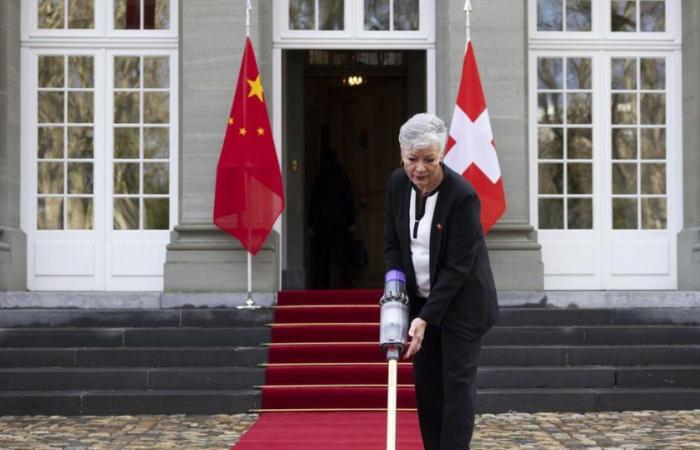This Monday marks the tenth anniversary of the free trade agreement between Switzerland and China. To celebrate this event and strengthen economic and scientific ties, Guy Parmelin, Federal Councilor in charge of the Economy, is traveling to China this week.
Switzerland is one of the rare countries to post a trade surplus with China. In 2023, this surplus reached a record of 22 billion francs. This indicator could be interpreted as a sign of the health of trade between the two nations. Moreover, the main objective of Guy Parmelin’s visit is to obtain the enlargement of the free trade agreement. We could deduce from this that our country therefore emerges a winner from the free trade agreement.
However, a more detailed analysis reveals a more complex situation. Benjamin Bürbaumer, lecturer in economics at Sciences Po Bordeaux, points out that this surplus is almost entirely attributable to the export of gold, a sector that is not directly favored by the free trade agreement.
Excluding gold, Switzerland has an average trade deficit of 2.5 billion francs per year with China, whereas before the agreement, trade was more balanced.
Technological dependence on China
Benjamin Bürbaumer also notes that Switzerland is accumulating growing deficits in several high-tech sectors, including electric machine tools and computers. This situation increases Switzerland’s technological dependence on China. “This phenomenon could intensify with China’s technological upgrade,” the economist said on Monday in La Matinale de la RTS.
Apart from gold, the Swiss pharmaceutical sector has also benefited from the free trade agreement. Pharma remains one of the areas where Switzerland maintains a competitive advantage.
For China, the benefits of this agreement are obvious. Simona Grano, a lecturer at the University of Zurich, explains that China sees Switzerland as “a stable financial and commercial market”, which makes the agreement particularly attractive. In addition, the fact that Switzerland was the first European country to conclude such an agreement with China gives it a “symbolic value”.
An “invisible cost” of the agreement
However, Simona Grano warns that this trade alliance has an “invisible cost” for Switzerland. The country tends to “self-censor” to avoid offending China, particularly on sensitive issues such as human rights and the situation of the Uighurs. The fear of economic or diplomatic reprisals encourages Switzerland to moderate its criticism.
Moreover, according to the sinologist, China could use these agreements as “a weapon” against other nations, as it did with Lithuania and Australia. The more a country is economically linked to China, the more it risks being pressured in the event of a political or diplomatic disagreement, explains Simona Grano.
Radio topics: Cléa Favre and Katja Schaer
Adaptation web: exercise






